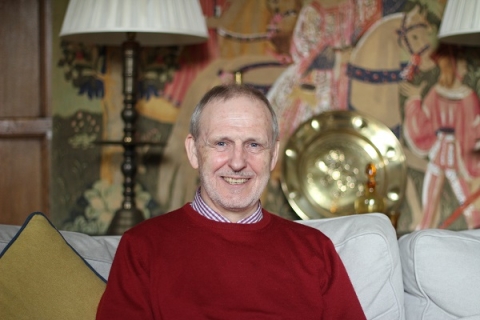

Professor Lloyd Peck, a polar marine biologist who has made his scientific career in the most extreme environment in the world, has received one of the most prestigious honours in science.
17 May 2024
7
A University of Portsmouth scientist is one of 90 exceptional researchers from across the world who have this year been elected to the Fellowship of the Royal Society.
The UK’s national academy of sciences has recognised them for their invaluable contributions to science.
Lloyd Peck is a Visiting Professor in Marine Biology at the University’s School of Biological Sciences.
I am overwhelmed by being asked to join a club that includes many of the UK science greats, Faraday, Rutherford, Darwin, Einstein and the list goes on and on.
Professor Lloyd Peck, Professor in Marine Biology at the University’s School of Biological Sciences
Professor Peck said: “I am overwhelmed by being asked to join a club that includes many of the UK science greats, Faraday, Rutherford, Darwin, Einstein and the list goes on and on. I have never thought of myself as an exceptional academic.”
Professor Peck was born in the town of Walsall, in the heart of the UK’s Black Country, so called because of the abundance of coal in the region. “I was from a solid working class manual labour family”, he explained.
“My first job was stacking sheep carcasses in a deep freeze. My second was loading car parts into a reheating furnace in a steel foundry. I was not top of my class at school – always top set and top half but never top.”
He is also an alumnus, having completed his PhD in the University of Portsmouth’s marine laboratory in 1983.
“I did not get a first in University. I did an applied PhD. I have always thought my research was solid and sometimes novel. Maybe I have been better than I thought.
“I absolutely loved my time at Portsmouth in the Marine Laboratory. My Supervisor, Michael Culley, gave me an opportunity that I am grateful for. He was more than a supervisor, he was a mentor and friend and absolutely took me under his wing.”
In 1984, a postdoc position came up at the British Antarctic Survey and Professor Peck applied. Since then, he has been to the Antarctic twenty times, most recently in February 2024, leading teams of polar biologists and investigating how life negotiates the boundaries of what we think is possible.
He added: “Portsmouth was a key stage in my career leading a team of polar biologists at the British Antarctic survey, writing over 300 science papers, supervising 53 PhD students and completing over 850 scuba dives in Antarctica. It is really hard to predict where things will end up.”
Drawn from across academia, industry and wider society, the new intake of Royal Society Fellows spans disciplines as varied as pioneering treatments for Huntington’s Disease, developing the first algorithm for video streaming, generating new insights into memory formation, and studying the origins and evolution of our universe.
Others to be elected include the Nobel laureate, Professor Emmanuelle Charpentier; an Emmy winner, Dr Andrew Fitzgibbon (for his contributions to the 3D camera tracker software “boujou”); and the former Chief Medical Advisor to the US President, Professor Anthony Fauci.
Sir Adrian Smith, President of the Royal Society, said: “I am pleased to welcome such an outstanding group into the Fellowship of the Royal Society.
“This new cohort has already made significant contributions to our understanding of the world around us and continues to push the boundaries of possibility in academic research and industry.
“From visualising the sharp rise in global temperatures since the industrial revolution to leading the response to the Covid-19 pandemic, their diverse range of expertise is furthering human understanding and helping to address some of our greatest challenges.
“It is an honour to have them join the Fellowship.”
Read the full list of new Fellows in 2024 here.
More like this...
Portsmouth astronomy project is nominated for ‘See Differently’ award
A University of Portsmouth project has been shortlisted for a Royal National Institute of Blind People (RNIB) See Differently Award in recognition of its groundbreaking work to make astronomy more accessible to children with a visual impairment.
24 April 2024
4 min read

Scientist wins international award for her work on developing cancer diagnosis technologies
11 April 2024
3 minutes

University professor wins national accounting and finance award
19 March 2024
2 minutes

